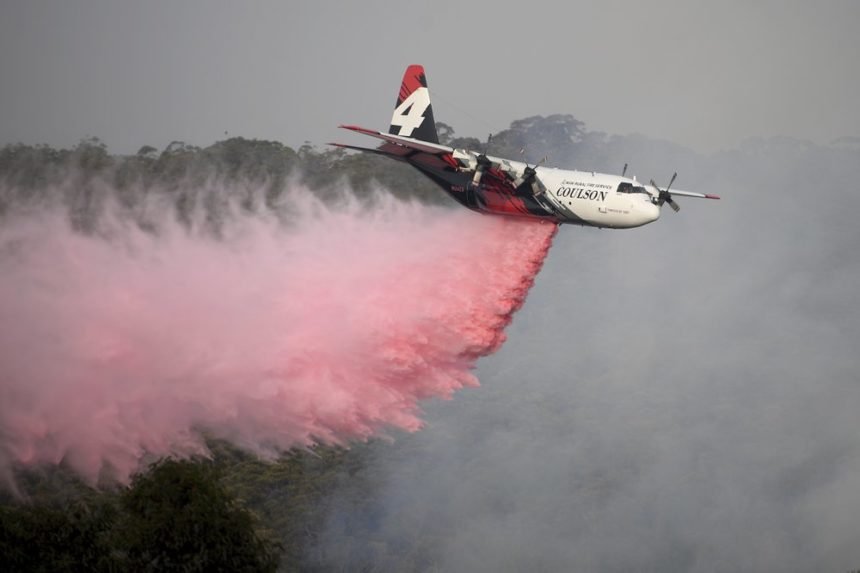Australia tries to recover bodies of 3 from US wildfire crew

SYDNEY (AP) — A tanker plane that crashed and killed its three American crew members as they fought wildfires in Australia had just dropped liquid to suppress the flames, investigators said Friday.
The crash Thursday killed Capt. Ian H. McBeth, 44, of Great Falls, Montana; First Officer Paul Clyde Hudson, 42, of Buckeye, Arizona; and Flight Engineer Rick A. DeMorgan Jr., 43, of Navarre, Florida, their employer, Canada-based Coulson Aviation, said in a statement.
The deaths came during an unprecedented wildfire season that has left a large swath of destruction in Australia’s southeast. More than 30 people have died, including three Australian volunteer firefighters.
Investigators went to where the C-130 Hercules tanker crashed in the Snowy Monaro region of the state of New South Wales, and a team was working to recover the Americans’ bodies, Australian Transport Safety Bureau Chief Commissioner Greg Hood told reporters.
He said it would be difficult to secure evidence and the remains because the wildfire is still burning and the team faces potential hazards such as aviation fuel.
Upward of 500 aircraft from several countries are fighting Australia’s wildfires, Hood said.
“So, if there are lessons to be learned from this particular accident, it’s really important that not only Australia learns these, but the world learns them,” he said.
Coulson Aviation said McBeth “was a highly qualified and respected C-130 pilot with many years fighting fire, both in the military” and with the company.
McBeth, who is survived by his wife and three children, also served with the Montana and Wyoming National Guards, the company said.
McBeth grew up in Wray, Colorado, a small town on the state’s rural eastern Plains. He learned how to fly in the Wyoming Air National Guard while he was a student at University of Wyoming, his father, Bill McBeth, said.
Ian McBeth worked as a construction specialist — a jack of all trades trained to build airfields for C-130s — and later as a navigator on the planes, including several tours in Iraq. He did the work after vision problems initially denied him becoming a pilot. He applied again at age 28, a year before his eligibility would run out, and was accepted.
“He was determined, tenacious and tough. Probably the most all around capable and competent person I ever knew,” Bill McBeth said.
Hudson graduated from the Naval Academy in 1999 and spent the next 20 years in different positions in the Marines, including as a C-130 pilot, Coulson Aviation said. He is survived by his wife.
DeMorgan served in the U.S. Air Force, with 18 years as a flight engineer on C-130s, the company said. He had more than 4,000 hours as a flight engineer, with nearly 2,000 hours in combat.
“Rick’s passion was always flying and his children,” Coulson Aviation said.
He is survived by two children, his parents and his sister.
A memorial service will be held Feb. 23 in Sydney for the U.S. and Australian firefighters who have died this wildfire season, New South Wales Premier Gladys Berejiklian said.
“We will pay tribute to the brave firefighters who lost their own lives protecting the lives and properties of others,” she said.
The three U.S. deaths brings the toll from the blazes to at least 31 since September. The fires also have destroyed more than 2,600 homes and burned more than 104,000 square kilometers (40,000 square miles), an area bigger than the U.S. state of Indiana.
Coulson grounded other firefighting aircraft as a precaution pending an investigation, reducing planes available to firefighters in New South Wales and neighboring Victoria state. The four-propeller Hercules drops more than 15,000 liters (4,000 gallons) of fire retardant in a single pass.
Berejiklian said more than 1,700 volunteers and personnel were in the field. Five fires were being described at an “emergency warning” level — the most dangerous on a three-tier scale — across the state and on the fringes of the national capital, Canberra.